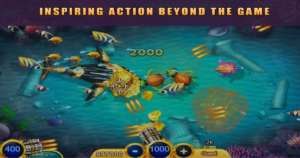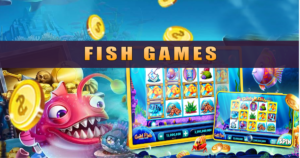Introduction:
Hello, friends of the sea and gaming aficionados! Ever pondered how the digital world of gaming can ripple into our real-world oceans? Today, we’re setting sail into the captivating realm of fish games. So, grab your virtual diving gear as we embark on an enlightening journey into the depths of fish games and their role in safeguarding our oceans! For more gaming excitement, explore the offerings at Okebet.
The Appeal of Fish Games
Fish games have a unique charm, don’t they? They attract people of all ages, from kids who are fascinated by the colorful marine life to adults who enjoy the strategic gameplay. What makes these games so appealing is their ability to transport players into a vibrant underwater world. It’s an immersive experience that can make learning about marine life fun and exciting. Plus, who doesn’t love the challenge of navigating through beautiful coral reefs or managing their virtual aquarium?
Educational Elements in Fish Games
Now, let’s talk about the educational side of these games. Many fish games are designed with realistic marine ecosystems, showcasing a variety of species and their habitats. For example, some games let you build and manage your own coral reef, teaching you about different types of coral and fish along the way. Others might simulate real-life challenges like pollution or overfishing, giving players a firsthand look at the issues facing our oceans. It’s a clever blend of entertainment and education, where you’re learning without even realizing it!
Raising Awareness Through Gameplay
One of the coolest things about fish games is how they can raise awareness about environmental threats. Imagine playing a game where you have to save your reef from an oil spill or help endangered species survive. These scenarios aren’t just fictional plots; they reflect real-world issues. By experiencing these challenges in a game, players can develop a deeper understanding of what’s happening in our oceans and why it’s crucial to protect them. It’s like stepping into the shoes, or should we say fins, of marine biologists and conservationists!
Inspiring Action Beyond the Game

But the impact of fish games doesn’t stop at the screen. These games can inspire players to take action in the real world. There are stories of gamers who started beach cleanups or joined conservation groups after playing fish games. Some games even collaborate with real-life conservation organizations, offering players a way to contribute to ocean-saving initiatives. It’s amazing how a virtual experience can lead to real-life activism, isn’t it?
Challenges and Limitations
Of course, creating the perfect fish game that’s both fun and informative isn’t easy. There’s a fine line between a game that feels like a lecture and one that subtly educates. Plus, games can only simulate so much. The complexity of marine ecosystems and conservation issues is hard to capture fully in a game. But hey, game developers are getting more creative and resourceful, finding new ways to make these games as impactful and educational as possible.
The Future of Fish Games in Conservation Education
Looking ahead, the future of fish games is as thrilling as a deep sea treasure quest. These games might become even more immersive and informative using technologies such as virtual reality (VR) and augmented reality (AR). Consider donning a virtual reality headset and swimming among dolphins or cleaning up a fake oil disaster. The options are limitless! And with greater collaboration between game creators, educators, and marine conservationists, we’re sure to see some amazing fish games in the future.
Conclusion:
So there you have it – a thorough dive into the world of fish games and their significance in raising awareness of marine conservation. These games are more than just a way to kill time; they are a doorway to learning about and conserving our seas.
Fish games provide a unique and entertaining method to learn about and contribute to marine conservation, whether you’re a gamer, a conservationist, or just someone who loves the sea. So the next time you play a fish game, know that you’re not only having fun; you’re also helping to rescue our seas. Let us continue to play, learn, and defend our lovely blue world!
Frequently Asked Questions (FAQs) about Fish Games and Marine Conservation Awareness
Q1: How do fish games actually help in marine conservation awareness?
A1: Fish games help in marine conservation awareness by simulating real-world ocean environments and challenges. They educate players about different marine species, the importance of ecosystems, and the impact of human activities like pollution and overfishing. This interactive form of learning can increase empathy and understanding of marine conservation issues.
Q2: Can playing fish games lead to real-world conservation actions?
A2: Yes, playing fish games can inspire real-world conservation actions. Players often become more aware of marine issues through these games and may feel motivated to participate in activities like beach cleanups, conservation campaigns, or supporting marine wildlife organizations.
Q3: Are there any specific fish games you recommend for learning about marine conservation?
A3: There are several games known for their educational content on marine conservation. Some popular ones include “Endless Ocean,” “Abzû,” and “Beyond Blue.” These games offer immersive experiences that focus on exploring and protecting ocean life.
Q4: Do fish games provide scientifically accurate information?
A4: Many fish games strive to provide scientifically accurate information, but the level of accuracy can vary. Some games are developed in collaboration with marine biologists and conservationists to ensure the information is reliable and educational.
Q5: Are these games suitable for all ages?
A5: Yes, most fish games are designed to be family-friendly and suitable for all ages. They offer a fun and engaging way for people of different age groups to learn about marine life and conservation.
Q6: How can educators use fish games in teaching?
A6: Educators can use fish games as interactive tools to complement traditional teaching methods. These games can be used to demonstrate marine biology concepts, environmental issues, and the importance of ecosystem conservation in an engaging and interactive manner.
Q7: Can fish games influence policy-making in marine conservation?
A7: While fish games primarily serve as educational tools, they can indirectly influence policy-making by raising public awareness and interest in marine conservation, which can lead to increased public pressure for policy change.
Q8: Are there any community projects linked to fishing games for conservation?
A8: Some fishing games partner with real-life conservation projects or organizations, allowing players to contribute directly to conservation efforts. These partnerships are often part of the game’s mission to create a positive impact beyond the virtual world.
Q9: How do I get involved in marine conservation after playing these games?
A9: After playing fishing games, you can get involved in marine conservation by joining local environmental groups, participating in beach cleanups, advocating for ocean-friendly policies, or donating to marine conservation organizations.
Q10: What future developments do you foresee in fishing games related to conservation?
A10: Future developments in fishing games may include more advanced virtual and augmented reality experiences, greater collaboration with scientific communities for accurate content, and more direct links between gameplay and real-world conservation efforts.

